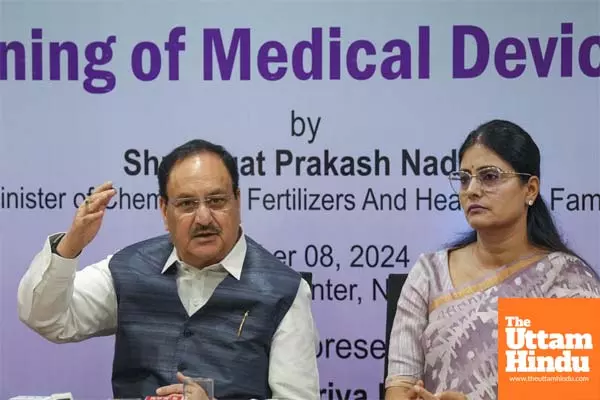
Centre announces ₹500 crore outlay for medical device sector, industry welcomes move

New Delhi (The Uttam Hindu): The Indian government has unveiled a ₹500 crore scheme aimed at strengthening the medical device industry, targeting critical areas such as manufacturing, skill development, clinical studies, infrastructure, and industry promotion. The scheme, named *Scheme for Strengthening the Medical Device Industry*, is expected to be a transformative step for the MedTech sector, with significant long-term benefits for both domestic manufacturers and the healthcare sector. Union Minister of Health and Family Welfare, JP Nadda, called the initiative a "game-changer," emphasizing that it would help the industry grow and push India toward becoming self-reliant in medical device production. He urged the industry to take full advantage of the support offered by the scheme and assured them of the government’s continued assistance.
Anupriya Patel, Minister of State for Chemicals and Fertilizers, also highlighted that the scheme would provide a much-needed boost to the MedTech sector. She stressed the increasing demand for medical devices, which are now a critical component of the healthcare industry. The government, she said, is actively designing policies and providing support to promote this vital sector. India’s medical device industry, valued at around $14 billion, is projected to grow to $30 billion by 2030. However, the sector faces challenges, particularly a lack of infrastructure. The new scheme includes provisions for developing common infrastructure in medical device clusters, such as R&D labs, testing centers, and animal labs, with financial assistance of up to ₹20 crore for common facilities and ₹5 crore for testing facilities. Another important aspect of the scheme is focused on reducing India’s reliance on imported components. The government will provide a one-time capital subsidy of 10-20% (with a maximum cap of ₹10 crore) to help domestic manufacturers develop key components, raw materials, and accessories.
The scheme also aims to address the skills gap in the sector by offering financial support for capacity building and skill development. This includes funding for Master's and short-term courses, with up to ₹21 crore available for Masters' programs and ₹10,000 per candidate for short-term courses in NCVET-approved institutions. A particularly groundbreaking component of the scheme is its support for clinical studies, which have long been a challenge for Indian medical device manufacturers. The government will provide financial assistance for animal studies (up to ₹2.5 crore), human clinical trials (up to ₹5 crore), and evaluations for in-vitro diagnostic products (up to ₹1 crore). This initiative aims to promote the safety and efficacy of Indian-made medical devices and assist manufacturers in obtaining product registrations for international markets.
The scheme will also support industry associations and export councils by providing funding for organizing conferences, conducting market research, and promoting Indian medical devices on the global stage. The medical device industry has welcomed the scheme, with the Association of Indian Medical Device Industry (AiMeD) noting that it will encourage Indian manufacturers to shift back to full-scale manufacturing. AiMeD emphasized that while the initial budget may seem modest, the scheme's long-term impact will be transformative, helping India realize its vision of becoming a global hub for medical device manufacturing. The Medical Technology Association of India (MTaI) praised the scheme for its comprehensive approach, focusing on five critical areas: manufacturing, skill development, clinical studies, infrastructure, and industry promotion. MTaI Chairman Pavan Choudary described the initiative as an "evidence-based simulation package" that would help both startups and established companies grow, benefiting from both local and global market opportunities. Overall, the scheme is seen as a crucial step toward enhancing India's capabilities in medical device manufacturing, reducing import dependency, and strengthening the country’s position as a global player in the MedTech sector.

